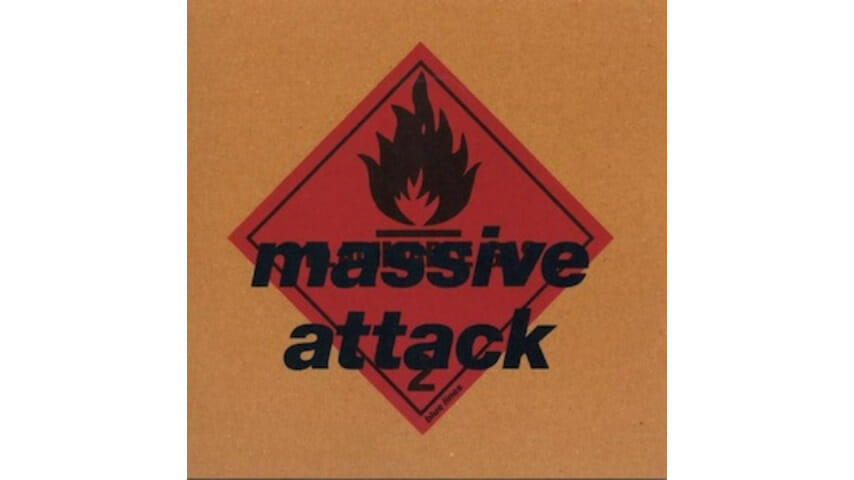Massive Attack: Blue Lines Reissue

We weren’t listening to Blue Lines in 1991. Whoever swears they were ahead of the curve and booming Blue Lines at its original summer release is either a veteran of the Bristol underground or an opportunistic liar.
In August of ‘91 we still hadn’t heard the first rumbles of the Wild Bunch, nor could we place the names 3D or Daddy G or Tricky Kid or Shara Nelson. We were listening to Seal. We were listening to Deee-Lite. We were listening to Pato Banton. We were losing our patience waiting for the Fine Young Cannibals and The Jungle Brothers to follow up The Raw and The Cooked and Done By The Forces Of Nature. We were losing our patience listening to the follow-up from Urban Dance Squad, wondering what the hell happened to “Fast Lane.”
We weren’t the only ones who overlooked Blue Lines. Outside the UK, sales were soft at best. In their year-end list, Spin rated Blue Lines below both a one-sided Soundgarden record and PM Dawn’s drifting debut. Rolling Stone lauded tracks by Jesus Jones and Naughty By Nature in their critics’ top singles, ignoring Blue Lines’ epic “Unfinished Sympathy.”
In 1991, we weren’t prepared to grasp Massive Attack’s concept of the musical group as an amorphous “soundsystem.” We thought of bands the way we thought of most things: you were in or you were out. We were over a decade into the Reagan/Bush/Thatcher-era. We didn’t believe in change; we believed in resignation. We didn’t believe in trust; we believed in Rage. We understood grunge; we understood gangsta rap. We were young. We liked rum and fistfights.
We first clued in to Massive Attack after hearing whispers of involvement by Nellee Hooper and Neneh Cherry. We liked “Back to Life.” We liked “Buffalo Stance.” We spun Blue Lines and couldn’t figure out exactly how Nellee Hooper and Neneh Cherry fit in. We’d embraced The KLF, Enigma, This Mortal Coil—even with their shadowy fronts, we were convinced those bands had identifiable auteurs at their core. We were young, but our approach to music was old. We were still dissecting Paul’s Boutique and trying to label which Beastie was responsible for which part. To comprehend an art we first needed to identify its author. We couldn’t get our arms around Blue Lines because the whole record was a freaking movement.
Even so, we didn’t banish our copies of Blue Lines to the used bins alongside all those Jesus Jones and Naughty By Nature discs. We hung on to Blue Lines because Scott Poulson-Bryant had championed the album, and unlike most of the adults in our lives, Scott Poulson-Bryant rarely let us down. We kept our copies in messy stacks in our dorm rooms, under the passenger seats of our cars, next to the half-broke boombox in the break room where we worked. We hung on to Blue Lines even though we still didn’t have the tools to process it. Stunning, star-turn vocals by a frontwoman who then disappeared for over half the album. Pass-the-mic posse raps where the only MC with an actual flow—Tricky—may or may not have been a full-fledged member of the band. Was this a band? Was this a compilation? Was that faithful rendition of “Be Thankful For What You Got” a sample or a remix or an old-fashioned cover? Was that middle-aged Rastafarian lost on his way to Reggae Sunsplash? Who the hell was the maker of this sound?
We didn’t know what to do with Blue Lines until three years later, when Tracy Thorn stepped up to the microphone and chilled us all out with “Protection.” We’ve always had a soft spot for white Englishwomen singing American R&B. We’ll always have Dusty In Memphis.
We put “Protection” on our headphones, we played it on repeat—over and over until at last we understood: the sound was the thing. Then we went and dug through the stacks in our dorm rooms; we reached under the passenger seats of our cars. We took our coffee-spattered copies of Blue Lines back from the break-room. We gave it another spin.
-

-

-

-

-

-

-

-

-

-

-

-

-

-

-

-

-

-

-

-

-

-

-

-

-

-

-

-

-

-

-

-

-

-

-

-

-

-

-

-








































